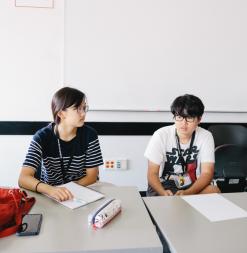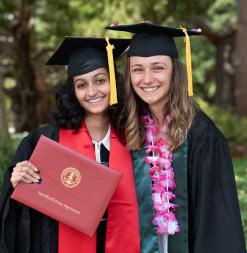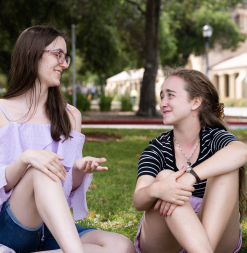Student Support Services
Academic Advising
Click headline to learn more about Academic Advising.
College Counseling
Click headline to learn more about College Counseling.
Counseling & Wellness
Click headline to learn more about Student Wellness.
Writing & Tutoring Center
Click headline to learn more about the Writing and Tutoring Center.
Student Support FAQ
Frequently Asked Questions for Academic Advising
Do all of my classes have to be taken at Stanford OHS?
Show
Hide
Do all of my classes have to be taken at Stanford OHS?
No, but requirements include a certain amount of classes be taken depending on your grade level. You will work with your academic advisor to determine how any transfer credit may be applied.
How are class times determined?
Show
Hide
How are class times determined?
We build our schedule from scratch every year. Each spring, we collect our students' approved course requests, as well as information on student and instructor schedule availability. Then we use software to create specific course sections that best accommodate these requests. Finally, students are enrolled in these sections, and the schedule is published.
How do I know what classes I am eligible to take each year?
Show
Hide
How do I know what classes I am eligible to take each year?
The course catalog lists the prerequisite requirements for each class. If you are a new student, or if you are taking a subject for the first time at Stanford OHS, you will take a placement test to determine the best fit.
What are the Stanford OHS graduation requirements?
Show
Hide
What are the Stanford OHS graduation requirements?
Students can find the Stanford OHS graduation requirements on the Graduation Requirements page.
Frequently Asked Questions for Counseling
What services does the Wellness Office provide?
Show
Hide
What services does the Wellness Office provide?
Our Wellness Office addresses students’ academic success as well as their social and emotional needs as adolescents. We support Stanford OHS students through a variety of services, including one-on-one short-term confidential counseling, check-ins with students regarding course assignments and workload, referrals to both in-house and outside counseling services, and consultations with parents, instructors, and other educators.
How are Stanford OHS students assigned to wellness counselors?
Show
Hide
How are Stanford OHS students assigned to wellness counselors?
Each counselor works with either high school students (grades 9–12) or middle school students (grades 7–8). Students are normally assigned to a counselor by their last name. Stanford OHS middle school students who continue into high school have the opportunity to work with the same counselor throughout each segment of their studies.
How can students contact their wellness counselor?
Show
Hide
How can students contact their wellness counselor?
Counselors are available by email, phone, and live videoconferencing.
How are appointments scheduled with wellness counselors?
Show
Hide
How are appointments scheduled with wellness counselors?
Students and families may schedule meetings with counselors by email or by using an online scheduling system. Appointments can also be made through a form on the Stanford OHS Gateway website.
Where can I find resources on general topics related to student health and wellness?
Show
Hide
Where can I find resources on general topics related to student health and wellness?
Extensive information on topics such as stress, nutrition, mindfulness, dating, grief, and mental health issues is available to enrolled Stanford OHS students through the counseling pages located in our learning management system.
Frequently Asked Questions for College Counseling
How does the Stanford OHS College Counseling Office operate? How do the college counselors help students?
Show
Hide
How does the Stanford OHS College Counseling Office operate? How do the college counselors help students?
The College Counseling Office acts as the main point of support for graduating students as they research and apply to colleges. The counselors advise about college lists, review application essays, and discuss general application logistics. In addition to meeting with individual students and families, our college counselors conduct periodic grade-level meetings and hold a college counseling class for juniors. The office is responsible for compiling and submitting all school-based application materials, including writing a school recommendation letter. College counselors also serve as a point of contact between Stanford OHS and college admissions offices.
Single-course and part-time students should use the college counselor or guidance counselor at the high school from which they will graduate as their main source of support through the college application process.
All students, regardless of enrollment status, are given access to the resources published by the College Counseling Office and are enrolled in periodic grade-level presentations for Stanford OHS families. All juniors and seniors are permitted to attend the fall visits to Stanford OHS by college admissions staff members.
How do colleges learn about Stanford OHS?
Show
Hide
How do colleges learn about Stanford OHS?
Each fall, we host admissions officers from a variety of colleges and universities to visit with Stanford OHS students. In addition to these visits, we are regularly in touch with admissions offices to answer any questions that arise and ensure that they have the materials and information they need in order to understand Stanford OHS.
At the time of application, we compile a comprehensive school report for each Stanford OHS graduate, which provides a clear narrative of the student’s academic path, how the student has engaged with our school, how it has benefited them, and the ways in which it has made them a strong candidate for admission. Beyond the narrative letter written on behalf of each student, we provide general information about Stanford OHS academics in the School Profile.
Which colleges do Stanford OHS students attend?
Show
Hide
Which colleges do Stanford OHS students attend?
Stanford OHS students attend diverse and reputable institutions both in the United States and abroad, ranging from small private liberal arts colleges to large public universities. Our college acceptance and matriculation page details the institutions to which our students have been accepted and matriculated over the past three years.
Does attending Stanford OHS increase a student’s likelihood of admission to Stanford University?
Show
Hide
Does attending Stanford OHS increase a student’s likelihood of admission to Stanford University?
Colleges and universities (including Stanford University) are familiar with the academic demands of Stanford Online High School. However, the fact that a student has attended or graduated from Stanford Online High School is not in and of itself a predictor of any college admissions outcome. Further, Stanford Online High School is not a ‘feeder school’ to Stanford University.
Stanford University does not consider “demonstrated interest” in making admission decisions. This means that actions such as visiting campus, or calling or emailing admissions staff. Attending Stanford Online High School or any Stanford University program will not increase a student’s likelihood of admission to the university.
Graduates who succeed at Stanford Online High School achieve college placement at a wide range of colleges and universities around the world. For a comprehensive list, please refer to our list of college acceptances and matriculations.





